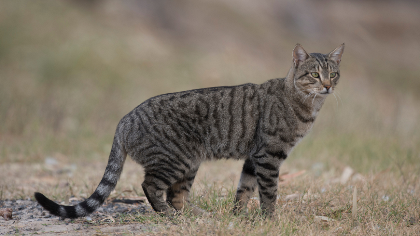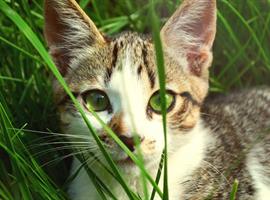Roaming semi-feral and undomesticated cats kill and disturb wildlife. In WA alone, 36 mammal species, 22 bird species, and 11 reptile species are threatened by cats.
Across Australia, cats have played a major role in the extinction of at least 27 mammal species and at present endanger 147 Australian mammals, birds, reptiles and frogs.

The City’s Cat Trapping Program aims to protect native wildlife from roaming cats in natural areas in the City of South Perth.
Traps are positioned within the Cat Prohibited Areas as listed in the City's Cats Local Law 2024.
The focus is on removing semi-feral and undomesticated cats, protecting wildlife whilst also ensuring cats are not harmed.
Cat trapping is undertaken by City Rangers in accordance with legislation and regulations, including the Animal Welfare Act 2002 and under section 52 of the Cat Act 2011.
Our focus is on protecting native wildlife. The program aims to protect native wildlife from roaming semi-feral and undomesticatedcats and improve biodiversity outcomes across the City.
Roaming semi-feral and undomesticated cats kill and disturb wildlife. According to the Department of Primary Industries and Regional Development, in WA alone, 36 mammal species, 22 bird species, and 11 reptile species are threatened by cats. Across Australia, cats have played a major role in the extinction of at least 27 mammal species and at present endanger 147 Australian mammals, birds, reptiles and frogs.
Roaming cats not only cause a nuisance through spraying and fighting with other animals, but they are also in danger of being injured themselves by vehicles and other animals. Additionally, they can mate with each other to produce unwanted kittens.
Cats will not be harmed when captured. The traps used to capture cats are cage traps equipped with a pressure plate that triggers the door to close. These traps do not utilise baits or latching mechanisms. While lures such as cat food may be used to attract animals, it is important to note that these are non-toxic and pose no harm to animals.
The traps are checked regularly (twice daily) to ensure trapped cats are not held for long periods of time.
Cat trapping is undertaken by City Rangers in accordance with legislation and regulations, including the Animal Welfare Act 2002 (the Act). Under the Act, mistreatment of cats may be an offence and is subject to prosecution.
While it is unlikely, it is possible that other wildlife could become trapped. To mitigate any potential harm to wildlife, City Rangers focus on areas where semi-feral and undomesticatedcats are known to frequent as listed in the City's Cats Local Law 2024.
The traps are checked regularly by Rangers to ensure wildlife and cats are not held for long periods of time. Any trapped wildlife will be released immediately.
Once captured, cats are transported to the Animal Care Facility located at 199 Thelma Street Como. Here, they are scanned for a microchip and, if registered, their owner is contacted to arrange collection.
The owner will be responsible for the applicable fees and charges for the release of their cat. Cats will be held for a minimum of eight business days to allow the owner to come forward.
Unregistered cats
It is a legal requirement in Western Australia that all domestic cats over six months be sterilised, microchipped, wear a tag in a public place and are registered with their local government.
Cats that are not microchipped or registered will be advertised on the City’s website to allow the potential owner to come forward and collect their cat.
Unidentified cats will be held at the Animal Care Facility for a minimum of four business days.
Impounded cats are assessed and monitored daily by the City’s Animal Care Facility officers. Any cats deemed to be behaviourally suitable for rehoming will be transferred to a rescue organisation. As a last resort, cats that are not deemed suitable for rehoming will be humanely euthanised in accordance with the Animal Welfare Act 2002.
The Cat Trapping Program will target Cat Prohibited Areas as listed in the City's Cats Local Law 2024.
The City’s Rangers are authorised under section 52 of the Cat Act 2011 to undertake this program.



